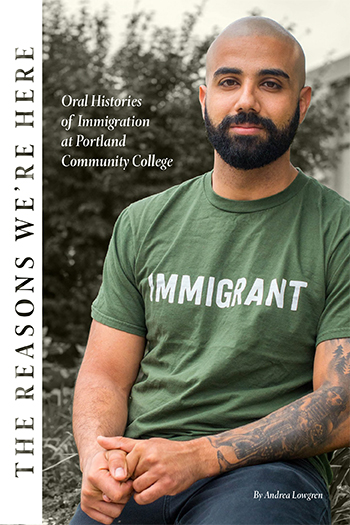This content was published: August 6, 2020. Phone numbers, email addresses, and other information may have changed.
The Reasons We’re Here: Oral Histories of Immigration at Portland Community College
Posted by Andrew Cohen
We are thrilled to share news of the publication of The Reasons We’re Here: Oral Histories of Immigration at Portland Community College, by Cascade Campus History and Women’s and Gender Studies Instructor and HARTS Council member, Andrea Lowgren.

The book, which Andrea completed during her sabbatical and was supported by a $40,000 Mellon/American Council of Learned Societies Community College Faculty Fellowship, was published in the spring. It consists of a “series of oral histories of immigration rooted in the people of Portland Community College.”
In the introduction, Andrea explains her motivation behind the book: “Portland, OR gets a lot of national attention for being one of the whitest major cities in the United States, but that isn’t exactly what I see when I look around my history classroom at Portland Community College. Over twelve percent of Portland is foreign born and I wager that the percentage at community college is higher; I see many different faces and hear many accents in my classroom. That diversity, however, isn’t always reflected in the curriculum, especially with respect to immigrants, and particularly with respect to US history. As a teacher I try to foster ways for students who are immigrants to see themselves as a core part of US history. I also want all students to see the connections between people’s lives and national policy. As the United States moves toward becoming even more multilingual, international, and globalized in politics, economics, and social issues, it is imperative for all students to understand that recent patterns of immigration are directly related to the history of imperialism, war, trade, and cultural politics of the United States.”
Already Andrea has been using the book in her classes, where students work on projects that are included in the publication as historical context. And the impact on students is deeply felt. As one student noted, “This project helped me a lot as a student because I actually wanted to do work I was proud of for the first time in my life. I think about school pragmatically, and I haven’t felt connected to the work I’m doing because it’s usually vacuous and empty. As more research piled up and the final project began to take shape, I found myself emotionally investing in the work I was doing. This wasn’t the comfortable, familiar “investment” I feel when I’m being pulled apart by perfectionism and deadlines like a human wishbone. It was a new feeling. Perhaps it was knowing about the possibility of publishing, or the looming threat of failure, or because I had no job to blindly fling all of my self worth into, but there were moments this term where I was proud of my product. I learned that I have to take school seriously because there are people behind every topic we research.”
You can read more student comments.
For her part, Andrea notes, “There were both tears and laughter in so many of these interviews. Many times I left the interview in a swirl of frustration at the cruelty of history and admiration for the tenacity of humanity. I’m humbled by this experience and feel immense gratitude for all who generously gave me their time and courageously shared their stories.”
The project was explicitly designed to be an open educational resource (OER) so that instructors in other disciplines can use the stories for projects outside of history, such as sociology, writing, or ESOL. As PCC instructors prepare for remote learning this can be a useful text for others to use.
An exhibit related to the book will be forthcoming when campuses reopen. For more information about project or how to use it in class, contact Andrea at andrea.lowgren@pcc.edu.
Congratulations, Andrea!
